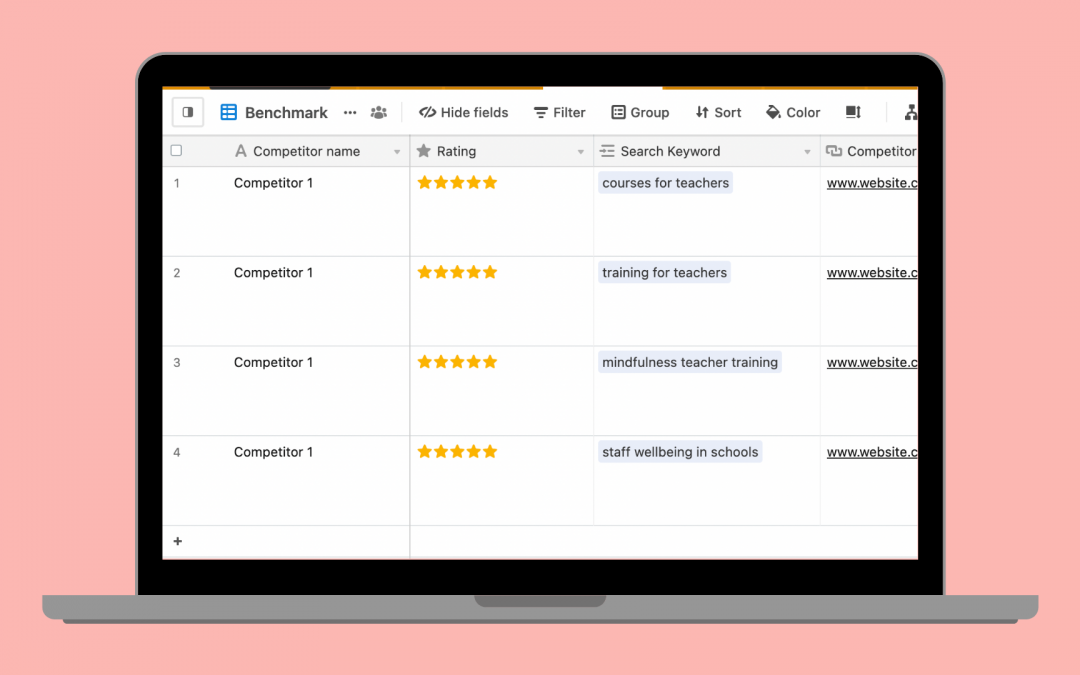When launching a business or a campaign, things can get pretty exciting pretty fast and the desire to launch almost impossible to contain.
This high energy is often great to get things done, but it can also be dangerous and make you burn some crucial steps: the research and the strategy.
Speaking with experience, having worked with entrepreneurs and small business owners for a couple of years now, there is nothing less frustrating than a launch getting postponed (or failing) because of a lack of preparation.
As entrepreneurs, we usually have the ideas and the plan in our head. We know the market (or some part of it), and we just want to test this new idea. So we hire a marketing consultant to help us launch, and then the consultant starts asking all these questions about the business model, the benchmark, the buyer persona… and we realise that we have nothing tangible.
Well, I want to help you avoid getting there and help you taking a step back so you can prepare the launch of your new business, idea, project or campaign in a confident manner! Running a Digital Marketing Benchmark will also help you define your Digital Marketing strategy and plan.
In this article, we’ll see how running a competitive benchmark can be a great way to validate your idea and position your offering. Running a digital marketing benchmark can be even better in terms of learning what tactics your competitors use to promote their products and services. We’ll see what you should benchmark against, how you should do it, and when.
Benchmarking as part of your Marketing Research
Together with your SWOT (identifying your strengths, weaknesses, opportunities and threats of the market), benchmarking is one of the first exercises to inform your business model.
Benchmarking is the practice of comparing business processes and performance metrics to industry bests and best practices from other companies. (source) It is very useful in order to see how your competitors market their products and services.
Who should you benchmark against?
Some of your competitors will be very known to you, so just start by making a list of them, and study them one after the other.
But don’t stop there, know that there are probably a lot of other successful stakeholders in the market that you haven’t thought of.
In this case, a few things to explore:
- Make a Google Search with the main keywords of your industry, trying different variations and synonymes.
- Use short tail keywords for your search like ‘online cooking class’ and long tail keywords like ‘online cooking class for women london’ ; ‘online cooking class for vegetarian’ ; ‘online cooking class french cuisine london’, etc.
- Try different locations to get information and inspiration about what’s offered in other areas. Try different cities: london, Manchester, Brighton… or try different countries, if relevant like the US, Canada, Malta..
- Use directories: another way to find your competitors is too browse directories. Directories are often part of the first results of your Google search, so you’ll easily find them.
What should you benchmark against?
For a new business or product idea, the first thing I would recommend, is to look at the marketing mix of your competitor. Let’s say you’re interested in launching a new membership to increase your recurring revenue.
Here are a few questions that could help you benchmark:
- What type of membership do they offer?
- What do they include in their membership
- What’s their starting and top price?
- Who do they target and how?
- How do they define themselves? (Here, I like to read the beginning of their ‘about us’ page)
- Do they have a free offering (lead magnet)?
If you hesitate between different types of offering, for example: pre-recorded courses, live group webinars, individual coaching… – find competitors in all these types of services, get all the information you need and think: what can I start doing easily and launch as a MVP (minimum valuable product)? What do I enjoy the most? What can I do myself and what can I delegate?
Focusing on Digital Marketing
My expertise in Inbound Marketing naturally leads me to make a focus on the competitors’ digital marketing practices as well.
Find below a few info I like to study during the benchmark:
The website
- How is the website organised
- Do they have a blog
- Do they capture contact details through a lead magnet? Pop-up forms?
- What type of content do they use? (videos, infographic, etc.)
Social media
- What platform are they on?
- How often do they post?
- What type of content? (live broadcasts, images, etc.)
- What’s their tone of voice? (fun, professional, approachable, etc.)
- What seems to work and what not?
Paid, owned or earned media?
- Do they advertise?
- Do they use influencers?
- What owned media do they use the most? Have a special look at their blog, their youtube channel and their newsletters.
Strategy
- What main CTA do they use?
- How do they redirect traffic?
- How do they capture data?
Making sense of your research and organising your findings
Browsing competitors’ websites one after another can quickly become overwhelming. After a few, you might not even remember who does what, which one was good to remember, which ones are good or bad examples… You might even want to save docs, pdfs, price cards or brochures of your competitors – which is why keeping track of your research in an organised way is essential to make the time invested valuable.
To organise the Marketing Benchmark for my clients, I use Airtable, a free project management tool.
In my Airtable base, which I use for all my marketing research (including Persona and Keyword research), marketing strategy and implementation (including the content calendar), I created a tab just to log all the data I learn during the benchmark including: the competitor name, website link, tagline, offering and price, product page link, website comments, social media and attachment.
Have a look at the view below for an idea of what it looks like
Learn more about my Marketing template on Airtable and how I use it to manage my marketing research, strategy and implementation
What tools to benchmark and practice social listening
Benchmarking is an endless exercise so make sure you limit yourself and structure your research. However, even if the exercise needs to have an end, it can be useful to always keep an eye on the market and continue your social listening.
Find below a few ways to do so:
On Facebook Insights: You can ‘watch’ up to 5 pages using the ‘pages to watch’ section in Facebook insights. This will allow you to compare your performance against 5 of your competitors with the following metrics: total likes, total posts this week, engagement this week.
On Twitter – Creating lists of competitors, clients, influencers and other stakeholders and using tweetdeck will help you keep an eye on their tweets and how they perform.
On Hootsuite – similar as tweetdeck but for several platforms, you can create lists by @mentions and #hashtags and always stay up to date with the latest content trends in your industry!
With Google Alert – Finally, you can also set up alerts for your main keywords to flag new competitors or trends as Media speak about them.
I hope you now feel ready and empowered to complete your competitive benchmark and launch this new business idea! To access the Airtable template, click here.

